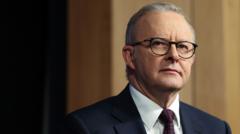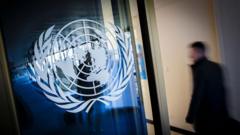Chris Wright's confirmation to lead the U.S. Department of Energy represents a pivotal moment for American energy policy, intertwining traditional fossil fuel interests with a stated commitment to address climate change challenges.
**Chris Wright Appointed as New Secretary of Energy Under Trump Administration**

**Chris Wright Appointed as New Secretary of Energy Under Trump Administration**
Former oil executive Chris Wright's confirmation signifies a significant shift in energy policy priorities amidst a divided Senate.
February 3, 2025, 6:35 p.m. ET
The U.S. Senate confirmed Chris Wright as the new Secretary of Energy, allowing the former fracking executive and founder of Liberty Energy to take the helm of the Department of Energy. His confirmation came via a 59 to 38 vote, with unanimous support from Republicans and a portion of Democrats joining ranks. Wright, now in charge of the Department, will wield substantial influence over the direction of President Trump’s energy policies.
In his Senate confirmation hearings, Wright emphasized his priority of "unleashing" American energy production, highlighting the push for liquefied natural gas and nuclear energy. However, he also attempted to bridge political divides by acknowledging climate change as a "global challenge that we need to solve" and expressing support for renewable energy initiatives, such as wind and solar power.
Despite these assurances, Wright's commitment toward advancing President Trump’s "bold" energy agenda raises questions. Trump has been known for his skeptical stance on climate change and has often advocated for an increase in oil, gas, and coal utilization, which could exacerbate climate issues.
The Department of Energy plays a crucial role in innovating energy technologies and managing 17 national laboratories engaged in significant research. This office also facilitates a loan program that supports numerous low-carbon energy projects across the country. Following the Biden administration's attempts to slow the approval of gas export terminals, Wright will spearhead the efforts to reactivate these reviews, aligning more closely with industry interests.
As Wright steps into this key government position, the balance of traditional energy pursuits and modern environmental responsibilities will be closely observed by both supporters and critics alike.
The U.S. Senate confirmed Chris Wright as the new Secretary of Energy, allowing the former fracking executive and founder of Liberty Energy to take the helm of the Department of Energy. His confirmation came via a 59 to 38 vote, with unanimous support from Republicans and a portion of Democrats joining ranks. Wright, now in charge of the Department, will wield substantial influence over the direction of President Trump’s energy policies.
In his Senate confirmation hearings, Wright emphasized his priority of "unleashing" American energy production, highlighting the push for liquefied natural gas and nuclear energy. However, he also attempted to bridge political divides by acknowledging climate change as a "global challenge that we need to solve" and expressing support for renewable energy initiatives, such as wind and solar power.
Despite these assurances, Wright's commitment toward advancing President Trump’s "bold" energy agenda raises questions. Trump has been known for his skeptical stance on climate change and has often advocated for an increase in oil, gas, and coal utilization, which could exacerbate climate issues.
The Department of Energy plays a crucial role in innovating energy technologies and managing 17 national laboratories engaged in significant research. This office also facilitates a loan program that supports numerous low-carbon energy projects across the country. Following the Biden administration's attempts to slow the approval of gas export terminals, Wright will spearhead the efforts to reactivate these reviews, aligning more closely with industry interests.
As Wright steps into this key government position, the balance of traditional energy pursuits and modern environmental responsibilities will be closely observed by both supporters and critics alike.























